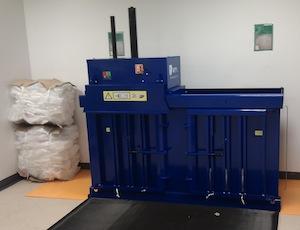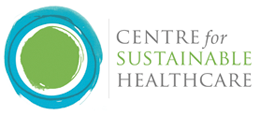- Group home
- You must register/login in order to post into this group.
Baling and Recycling of Bottles & Cardboard

By: Newcastle Upon Tyne Hospitals NHS Foundation Trust
£7,384 net savings (Actual)
85.2 tonnes CO2e (Estimated)
The Renal Unit produces huge amounts of waste plastic and cardboard during its clinical activities. In order to recycle this waste the Trust installed two new pieces of equipment. A cardboard baler was installed to service the whole Freeman Hospital site in March 2011, which allowed the Renal Unit’s cardboard to be baled and recycled. In November 2011 a smaller twin baler was also installed to crush and bale the segregated 5L acid bottles from each renal dialysis session. Cardboard and plastic bottle recycling has increased by over 90 tonnes and savings of over £7,000 have been achieved.
The project was initiated by consultant nephrologist, Dr Alison Brown, and modern matron, Julia Harding. Using the commitment shown by the renal department, the Trust Waste Officer was able to justify a business case and gain Executive approval.
Equipment comprises a Static Vertical Mill Sized Baler (MX600) on long term rental for cardboard, and a twin chamber compact baler (Compact 75) on two-year rental for dialysis 5L plastic bottles. Baled cardboard and bottles are collected by SITA UK (the Trust's general waste contractor).
Environmental Benefits
An estimated 12 tonnes of plastic bottle waste is produced by the renal department each year. Recycling all of this will save approximately 3.168 tonnes CO2e per year (1).
The renal unit has also been contributing its flattened cardboard to the main Freeman Hospital cardboard baler. Approximately 100 tonnes of cardboard waste is produced annually and recycling this saves an estimated 82 tonnes CO2e per year (2). Unfortunately we are not able to break this down to the specific amount of cardboard produced by the Renal Unit as all areas of the hospital feed into the main cardboard baler.
Total carbon savings from recycling of plastic and cardboard are therefore approximately 85.2 tonnes CO2e per year.
Importantly, recycling materials also reduces the need for virgin resources for new products. Although the benefits of this are hard to quantify, we know that increasing the recycling of resources instead of just disposing of them makes sense.
Furthermore, the compaction saves on CO2e emissions from large waste vehicle movements, since the much smaller volumes can be more easily stored and therefore collected less frequently.
(1)This is based on -230 kg CO2e per tonne of plastic recycled vs 34 kg CO2e per tonne of plastic sent to landfill (Annex 9, DEFRA 2011 Greenhouse Gas Conversion Factors for Company Reporting)
(2) This is based on -240 kg CO2e per tonne of cardboard recycled vs 580 kg CO2e per tonne of cardboard sent to landfill (Annex 9, DEFRA 2011 Greenhouse Gas Conversion Factors for Company Reporting)
Financial Benefits
The financial savings are summarised below:
|
Waste Type |
Predicted Annual Weight of Waste |
Previous Total Disposal Costs |
New Annual Baler Rental |
New Disposal Costs |
New Total Annual Costs |
Net costs |
|
Plastic Bottles |
12t |
£720 |
£1,456 |
-£540 |
£916 |
£196 |
|
Cardboard |
100t |
£6,000 |
£2,920 |
-£4,500 |
-£1,580 |
-£7,580 |
|
Totals |
112t |
£6,720 |
£4,376 |
-£5,040 |
-£664 |
-£7,384 |
To reduce the environmental impact and cost of waste disposal. The project was inspired by an early Green Nephrology case study: http://map.sustainablehealthcare.org.uk/heart-england-nhs-foundation-trust/diversion-waste-recycling-stream-through-use-baling-machines .
SITA UK (long term lease of cardboard baler; collection and rebate for baled cardboard and plastic). Local firm ATK Equipment (2-year lease of plastic bottle baler).
Sustained change has been maintained through positive reinforcement (telling staff and porters what we have saved so far by distributing graphs in our Green News and passing on information at team meetings) and regular visits by the Waste Officer to iron out any small issues. We plan to continue with the dissemination of regular update graphs to staff.
The project was the winner of the Green Nephrology Awards 2012; the award entry poster can be downloaded here.
£4,376 (annual rental costs for balers)
